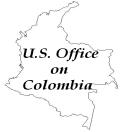 |
| Home | | |
Analyses | | |
Aid | | |
| |
| |
News | | |
| |
| |
| |
| Last
Updated:7/23/03 |
| Statement
from four U.S. Non-Governmental Organizations, July 23, 2003
For Immediate
Release: July 23, 2003 US Congress
Sees Colombian Military as “Weak Link in Fight Against Terrorism” Congress
Divided over Aid to Colombia, Citing Links Between Colombian Military
and Terrorists Washington, July 23— Military aid to Colombia continued to be one of the most controversial issues on the foreign aid bill, as a sharply divided Congress today debated the human rights record of Colombia’s military and the efficacy of US anti-drug policy. Deriding US policy toward Colombia as “immoral and inexcusable,” House Democrats led a charge to reduce Colombia’s military and police assistance for next year, an effort that garnered bipartisan support despite a last-minute push by Secretary Powell and House Speaker Dennis Hastert to derail the vote. On July 17th, the Senate Appropriations Committee reduced the amount of funding for the Andean Counternarcotics Initiative, which includes aid to Colombia, by over $30 million. Senate report language accompanying the bill noted that "The Committee views the Colombian military as a particularly weak link in the fight against terrorism and narcotics." The House amendment to the foreign operations appropriations bill would have cut $75 million of the over $430 million in military and police assistance for Colombia in the bill and transferred the money to global HIV/AIDS programs. In 2001, Congress voted on a similar measure which gained the support of 179 members. Despite the absence of many members of Congress at the 1 am vote today, 195 members supported a cut to Colombia’s military and police aid. 226 voted against. Since 2000, Colombia has received over $2.5 billion dollars from the United States, most of it military and police assistance for anti-drug and anti-terrorism activities. Among the 9 representatives who spoke on the floor in favor of reducing the aid were the amendment’s co-sponsors, Reps. McGovern (D-MA) and Skelton (D-MO). Both questioned continued funding for a policy they say has failed to reach its stated goals. Members of Congress sharply criticized the Colombian government’s failure to break ties between its armed forces and right-wing paramilitary groups on the State Department’s list of foreign terrorist organizations. House Democratic Whip Jan Schakowsky (D-IL) condemned the policy as “giving more money to a military known to collaborate with a group the Bush Administration says are terrorists” and then asked, “Why would any member of this body want to make the mission of terrorists and criminals easier?” The amendment’s supporters also argued that US anti-drug policy in Colombia has failed to stem net drug production in the Andes, instead moving coca cultivation back into Bolivia, Peru, and other areas once lauded as drug eradication successes. Citing a study by the ONDCP of US high school students, Representative McGovern noted that “the availability of cocaine in the United States actually increased in 2002.” The amendment reflected growing unease over escalating US involvement in Colombia's armed conflict, despite efforts by the Colombian government to extend US military aid beyond the five years envisioned in Plan Colombia. Members made it clear they did support US aid to Colombia, but wanted to see a serious rethinking of the current policy. They echoed concerns raised in a recent report by the US government’s General Accounting Office, which found that the State and Defense Departments “have still not… identified a proposed end state [to involvement in Colombia], or determined how they plan to achieve it.” The amendment also reflected congressional conviction that President Bush should live up to his State of the Union promises to provide $15 billion over 5 years for the AIDS pandemic. The following analysts are available for comment on today’s Colombia vote:
|
|
|
| Asia | | |
Colombia | | |
| |
Financial Flows | | |
National Security | | |
| Center
for International Policy |



